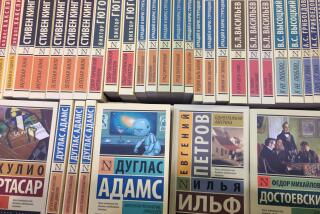OJAI : Soviet Describes Life Without Nintendo
- Share via
Helen Borisovna, one of 12 Soviet citizens visiting Ventura County for three weeks to learn American business practices, was about to get a lesson in the priorities of American children.
After hearing Borisovna describe the Black Sea town of Sochi where she teaches in an English-language school, the 160 fidgety grade-school students of Ojai Valley School had the chance to ask her what life in the Soviet Union was really like.
Do Russians have video recorders? one student wanted to know. They are “a great treasure” possessed only by the rich, Borisovna said.
How about chewing gum? another asked. Gum is very expensive, but can be found in non-state stores, she replied, adding the warning that the constant chewing of gum “is bad for (a student’s) pronunciation.”
In the remaining question-and-answer session last week, students wanted to know if baseball cards, Rollerblades and Nintendo games were available in the Soviet Union.
Borisovna said Rollerblades could be found, but she needed an explanation about baseball cards and Nintendo.
Despite the apparent cultural gap, Borisovna said later that she saw little difference between the Ojai students and the children who attend the elite, state-run school where she teaches.
Even so, Borisovna described Russian children as “struggling for knowledge” to arm themselves against the hard times that are expected with the coming of a market society.
“If you don’t know things, you lose,” she said in explaining the new Russian attitude.
Differences that still exist between the former Cold War adversaries are fading, she said. In fact, in the past five years, Soviet education has thrown off the shackles of rote memory drills imposed by the central government.
“We now share the same principles of psychology as the teachers here and use a communications approach in our teaching,” said the 30-year-old teacher, who said she would like to start a small, private school of her own in Russia.
Much of Borisovna’s time in the Enterprise Development Program, sponsored by the San Francisco-based Center for U.S.-U.S.S.R. Initiatives, was spent observing classes at the Ojai Valley School, particularly its courses in English as a Second Language.
What she has seen has helped her better understand her own country.
“When we had no access to foreign media, we did not know how lousy our lives were,” she said. “Now we are deprived of that luxury.”
More to Read
Sign up for Essential California
The most important California stories and recommendations in your inbox every morning.
You may occasionally receive promotional content from the Los Angeles Times.













